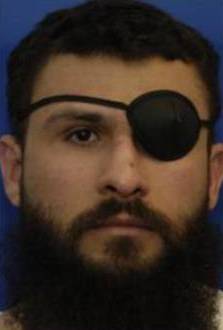
Abu Zubaydah is a Saudi Arabian currently held by the U.S. in the Guantanamo Bay detention camp in Cuba. He is held under the authority of Authorization for Use of Military Force Against Terrorists.
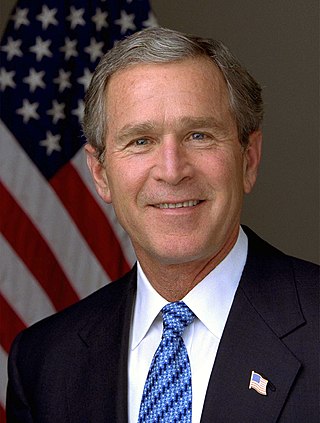
George W. Bush's tenure as the 43rd president of the United States began with his first inauguration on January 20, 2001, and ended on January 20, 2009. Bush, a Republican from Texas, took office following a narrow victory over Democratic incumbent vice president Al Gore in the 2000 presidential election. Four years later, in the 2004 presidential election, he defeated Democrat nominee John Kerry to win re-election. Bush was succeeded by Democrat Barack Obama, who won the 2008 presidential election.

The National Commission on Terrorist Attacks Upon the United States, also known as the 9/11 Commission, was set up on November 27, 2002, "to prepare a full and complete account of the circumstances surrounding the September 11 attacks", including preparedness for and the immediate response to the attacks. The commission was also mandated to provide recommendations designed to guard against future attacks.

Joseph Charles Wilson IV was an American diplomat who was best known for his 2002 trip to Niger to investigate allegations that Saddam Hussein was attempting to purchase yellowcake uranium; his New York Times op-ed piece, "What I Didn't Find in Africa"; and the subsequent leaking by the Bush/Cheney administration of information pertaining to the identity of his wife Valerie Plame as a CIA officer. He also served as the CEO of a consulting firm he founded, JC Wilson International Ventures, and as the vice chairman of Jarch Capital, LLC.
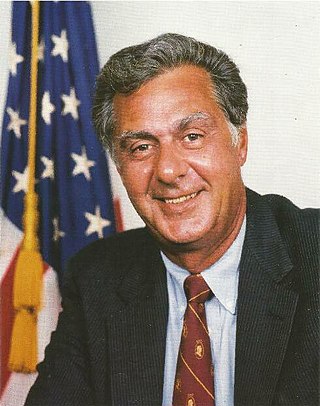
Richard Keith Armey is an American economist and politician. He was a U.S. Representative from Texas's 26th congressional district (1985–2003) and House Majority Leader (1995–2003). He was one of the engineers of the "Republican Revolution" of the 1990s, in which Republicans were elected to majorities of both houses of Congress for the first time in four decades. Armey was one of the chief authors of the Contract with America. Armey is also an author and former economics professor. After his retirement from Congress, he has worked as a consultant, advisor, and lobbyist.
The Saddam–al-Qaeda conspiracy theory was a conspiracy theory based on allegations made by U.S. government officials, who claimed that a highly secretive relationship existed between Iraqi President Saddam Hussein and the radical Islamist militant organization Al-Qaeda between 1992 and 2003, specifically through a series of meetings reportedly involving the Iraqi Intelligence Service (IIS). In the lead-up to the Iraq War, George W. Bush administration officials alleged that the Saddam Hussein regime had an operational relationship with al-Qaeda, basing the administration's rationale for war, in part, on this allegation and others.
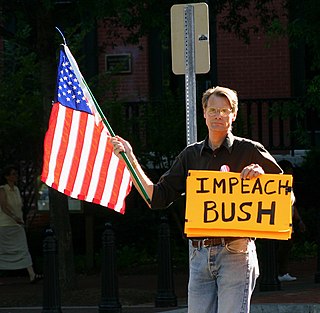
During the presidency of George W. Bush, several American politicians sought to either investigate Bush for possible impeachable offenses, or to bring actual impeachment charges on the floor of the United States House of Representatives Judiciary Committee. The most significant of these efforts occurred on June 10, 2008, when Congressman Dennis Kucinich, along with co-sponsor Robert Wexler, introduced 35 articles of impeachment against Bush to the U.S. House of Representatives. The House voted 251 to 166 to refer the impeachment resolution to the Judiciary Committee on June 11, where no further action was taken on it. Bush's presidency ended on January 20, 2009, with the completion of his second term in office, rendering impeachment efforts moot.
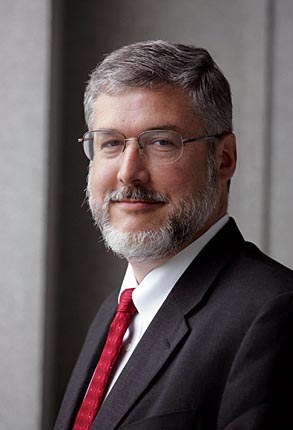
David Spears Addington is an American lawyer who was legal counsel (2001–2005) and chief of staff (2005–2009) to Vice President Dick Cheney. He was the vice president of domestic and economic policy studies at the Heritage Foundation from 2010 to 2016.

NSA warrantless surveillance — also commonly referred to as "warrantless-wiretapping" or "-wiretaps" — refers to the surveillance of persons within the United States, including U.S. citizens, during the collection of notionally foreign intelligence by the National Security Agency (NSA) as part of the Terrorist Surveillance Program. In late 2001, the NSA was authorized to monitor, without obtaining a FISA warrant, phone calls, Internet activities, text messages and other forms of communication involving any party believed by the NSA to be outside the U.S., even if the other end of the communication lays within the U.S.

The Terrorist Surveillance Program was an electronic surveillance program implemented by the National Security Agency (NSA) of the United States in the wake of the September 11, 2001 attacks. It was part of the President's Surveillance Program, which was in turn conducted under the overall umbrella of the War on Terrorism. The NSA, a signals intelligence agency, implemented the program to intercept al Qaeda communications overseas where at least one party is not a U.S. person. In 2005, The New York Times disclosed that technical glitches resulted in some of the intercepts including communications which were "purely domestic" in nature, igniting the NSA warrantless surveillance controversy. Later works, such as James Bamford's The Shadow Factory, described how the nature of the domestic surveillance was much, much more widespread than initially disclosed. In a 2011 New Yorker article, former NSA employee Bill Binney said that his colleagues told him that the NSA had begun storing billing and phone records from "everyone in the country."
David Wurmser is an American foreign policy specialist. He served as Middle East Adviser to former US Vice President Dick Cheney, as special assistant to John R. Bolton at the State Department and as a research fellow on the Middle East at the American Enterprise Institute (AEI). He served in the U.S. Navy Reserve as an intelligence officer at the rank of Lieutenant Commander.

Richard Bruce Cheney is an American politician and businessman who served as the 46th vice president of the United States from 2001 to 2009 under President George W. Bush. He is currently the oldest living former U.S. vice president, following the death of Walter Mondale in 2021.
The alleged Prague connection between Iraq and Al Qaeda came through an alleged meeting between September 11 hijacker Mohamed Atta and Iraqi consulate in April 2001. This alleged connection is notable because it was a key claim used by the Bush administration to justify the 2003 U.S.-led invasion of Iraq. The Czech counterintelligence service claimed that Mohamed Atta al-Sayed, a September 11 hijacker, met with Ahmad Samir al-Ani, the consul at the Iraqi Embassy in Prague, in a café in Prague. This claim, sometimes known as the "Prague connection", is generally considered to be false and has been said to be unsubstantiated by the Senate Intelligence Committee in the United States.

Barton David Gellman is an American author and journalist known for his reports on the September 11 attacks, on Dick Cheney's vice presidency, and on the global surveillance disclosure. Beginning in June 2013, he authored The Washington Post's coverage of the U.S. National Security Agency, based on top secret documents provided to him by ex-NSA contractor Edward Snowden. He published a book for Penguin Press on the rise of the surveillance-industrial state in May 2020.

The Prosecution of George W. Bush for Murder is a 2008 book by Vincent Bugliosi, a former prosecutor in Los Angeles. He argues that President George W. Bush took the United States into the invasion of Iraq under false pretenses and should be tried for murder for the deaths of American soldiers in Iraq.
The Habbush letter, or Habbush memo, is a handwritten message dated July 1, 2001, which appears to show a link between al-Qaeda and Iraq's government. It purports to be a direct communication between the head of Iraqi Intelligence, General Tahir Jalil Habbush al-Tikriti, to Iraqi president Saddam Hussein, outlining mission training which Mohamed Atta, one of the organizers of the September 11 attacks, supposedly received in Iraq. The letter also claims that Hussein accepted a shipment from Niger, an apparent reference to an alleged uranium acquisition attempt that U.S. President George W. Bush cited in his January 2003 State of the Union address.
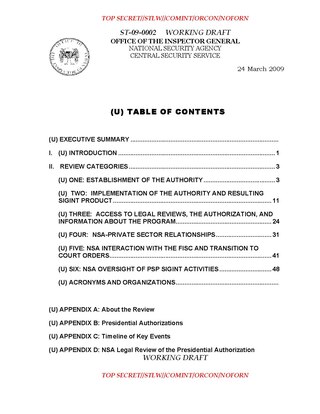
"Stellar Wind" was the code name of a warrantless surveillance program begun under the George W. Bush administration's President's Surveillance Program (PSP). The National Security Agency (NSA) program was approved by President Bush shortly after the September 11, 2001 attacks and was revealed by Thomas Tamm to The New York Times in 2004. Stellar Wind was a prelude to new legal structures that allowed President Bush and President Barack Obama to reproduce each of those programs and expand their reach.

The President's Surveillance Program (PSP) is a collection of secret intelligence activities authorized by the President of the United States George W. Bush after the September 11 attacks in 2001 as part of the War on Terrorism. Information collected under this program was protected within a Sensitive Compartmented Information security compartment codenamed STELLARWIND.

In My Time: A Personal and Political Memoir is a memoir written by former Vice President of the United States Dick Cheney with Liz Cheney. The book was released on August 30, 2011, and outlines Cheney's accounts of 9/11, the War on Terrorism, the 2001 War in Afghanistan, the run-up to the 2003 Iraq war, enhanced interrogation techniques and other events. According to Barton Gellman, the author of Angler: The Cheney Vice Presidency, Cheney's book differs from publicly available records on details surrounding the NSA surveillance program. Cheney discusses his both good and bad interactions with his peers during the Presidency of George W. Bush.














